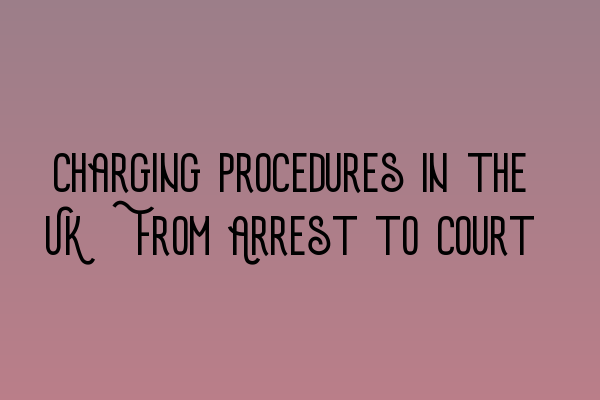Charging Procedures in the UK: From Arrest to Court
At SQE Criminal Law & Practice Law UK, we understand the importance of understanding the charging procedures in the UK criminal justice system. From the moment an individual is arrested to the point they appear in court, there are a series of steps and considerations that need to be followed.
Arrest
The charging process begins with the arrest of a suspect. At this stage, the police have reasonable grounds to believe that the person has committed an offense. During the arrest, the suspect’s rights are protected, and they must be informed of the reasons for their arrest and the offense they are being accused of. It is important for suspects to understand their rights and seek legal representation at the earliest opportunity.
Once arrested, the police have the power to detain the suspect for questioning. This can happen at a police station, where the individual’s fingerprints, DNA, and other personal details may be taken. It is crucial for suspects to cooperate during this process to avoid further complications.
Custody
After being arrested, the suspect may be held in custody for a period of time. During this period, the police investigate the alleged offense, collect evidence, and assess whether there are sufficient grounds to charge the suspect. The suspect may be interviewed by the police to gather more information and clarify their involvement in the alleged offense.
It is important to note that suspects have the right to legal representation during their time in custody. Seeking legal advice from a solicitor who specializes in criminal law can provide valuable guidance and ensure that the suspect’s rights are protected throughout the process. At SQE Criminal Law & Practice Law UK, our team of experienced solicitors is here to support you.
Charge or Release
Once the police have completed their investigation, they must make a decision on whether to charge the suspect or release them without charge. If the police decide there is enough evidence to support a charge, they will consult with the Crown Prosecution Service (CPS) to determine the appropriate charge to be brought against the suspect.
If a decision is made to charge the suspect, they will be issued with a Charge Sheet, which outlines the offense(s) they are being charged with. This document serves as a formal notification and provides details of the offense(s) committed. It is essential for suspects to carefully review the Charge Sheet and seek legal advice to understand the implications and potential consequences they may face.
If the police decide there is insufficient evidence or it is not in the public interest to proceed with the case, they may release the suspect without charge. In such cases, the suspect is free to go and should seek legal advice to explore any potential recourse or implications that may arise from the arrest.
Court Proceedings
Once a suspect is charged, they will be required to appear in court. The specific court where the case will be heard depends on the nature and seriousness of the offense. The charge and court venue will be communicated to the suspect, who must attend court on the specified date and time.
It is crucial for defendants to have legal representation when appearing in court. A solicitor who specializes in criminal law can provide expert advice, build a strong defense case, and guide the defendant through the court proceedings. At SQE Criminal Law & Practice Law UK, our dedicated team of solicitors will diligently work to protect your rights and achieve the best possible outcome for your case.
Understanding the charging procedures in the UK is essential for individuals who find themselves involved in the criminal justice system. Seeking professional legal advice from experienced solicitors is crucial in order to navigate through the complex process. For additional information, you can explore the following related articles on our website:
- SQE 1 Practice Exam Questions
- SQE 1 Practice Mocks FLK1 FLK2
- SQE 2 Preparation Courses
- SQE 1 Preparation Courses
- SRA SQE Exam Dates
If you have any further questions or would like to discuss your specific legal needs, please do not hesitate to contact us at SQE Criminal Law & Practice Law UK.
